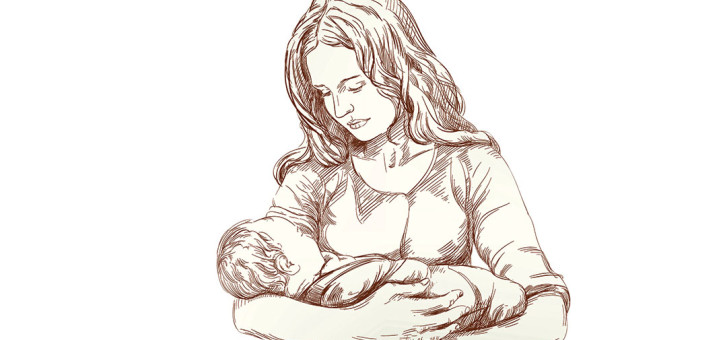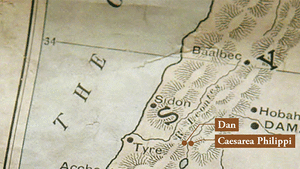Recently, my wife and I stayed with friends in Lyon, France. It was a crowded house as the adult children also came to visit. We enjoyed late northern summer evenings around a long outdoor table with simple meals. Attention was often focused on the little ones—a baby gurgling and falling asleep in his aunt’s arms, his older brother shyly watching.
Imagine the home in Bethlehem, a cluster of perhaps 50 to 60 homes in the rugged Judean hills only eight kilometres south of Jerusalem, in full view of the Herodium, a cone-shaped hill-top fortress-palace, soon to be the burial site of Herod the Great. Their home was crowded too. Tradition suggests some of Jesus’ brothers and sisters might have been older children of Joseph from a former marriage. Had they also travelled to Bethlehem—the “place of meat or bread”—a place for farming wheat, barley and sheep?
The extended family would gather for evening meals, the men in from the fields and the animals gathered in the cave adjacent to the main living area. Mary and Joseph had come to Bethlehem to register for a census, and “while they were there, the time came for the baby to be born” (Luke 2:6). In the Gospels, there is no suggestion of a breathless arrival in the village, with baby Jesus born that night!
It would have been unthinkable for Mary to be left without care, to give birth alone or with a man (Joseph) present. It is true: Bethlehem was crowded, but no Middle Eastern family would neglect a pregnant wife—and there is no suggestion they did. Just the opposite! The family’s guest room—called an “inn” but not the same as a commercial inn—was occupied.1 But that doesn’t mean they were left out in a stable.
Imagine the excitement. Women cleared the family living area where the cooking and baking was done, where the family slept each night. This space was adjacent to a lower area (maybe a cave, from which the home extended)2 where animals rested during the night, with their feeding troughs or “mangers” in the floor of the living space, their presence providing warmth for the family during the winter months. The men would have been banished, the baby was born, wrapped and placed in the perfect crib, “a manger” in the heart of the home.
Months passed but there were already memories. The shepherds received the good news. Understanding the value of life, they found the Baby as they had been told and “spread the word”—“glorifying and praising God” (Luke 2:20). Jesus was born in poverty, welcomed by the roughest and poorest.3 You can imagine the talk of the women. As was usual, Jesus was circumcised when eight days old and that had healed well.
And I can imagine Joseph was more relaxed now! He had not been impressed when he learnt of Mary’s pregnancy. They were not married and there had been no sex. He was sceptical that her pregnancy was a miracle—and justifiably upset. God—or Mary—had some explaining to do! And his explanation: God had become a foetus and would be born a baby. Now this baby Jesus was settled and feeding at Mary’s breast!
This is called the incarnation of God, a Latin expression meaning “God in the flesh”! It is one of the great mysteries of Christian faith, the belief that Jesus did not stop being God but became truly human: both human and God at the same time!4
But why did God think He needed to do this? Why become a foetus, a baby, a boy, grow through puberty, as a teenager learn and pursue a builder’s trade? What did it mean for Jesus? And what does it mean for us?
Why did God become a baby?
If you Google “why Jesus became human”, you will discover a whole bunch of ideas. Instead, I searched the New Testament and found two reasons:
ONE: Jesus wanted to show
what God is like, and
TWO: He became truly like
us to save us!
God has been portrayed as fearful: domineering, dictatorial, angry, vengeful, judgmental and even selfish. Sometimes gods were depicted as immoral, spiteful—worse than human!
But Jesus came to display what God is actually like. He said, “This is the very reason I came”—to glorify my Father (John 12:27). During His trial, He said to Pontius Pilate: “For this reason I was born and for this I came into the world, to testify to the truth”—to show what God is really like, so we are no longer in the dark (John 18:37).5 If you want to know what God is like, read the stories of Jesus in the Gospels. He’s God!
What did it mean for Jesus?
While Jesus was called “the holy one” (Luke 1:35), without even an inner bent toward evil, He was born into an ordinary unholy Jewish family.6 The village kids might have asked about His dad. If He had any recollection or growing awareness of what life was like before, it must have been weird. What did He experience for the first time? He would have cared for sheep and donkeys, helped gather olives and grapes. He got work as a builder, maybe in the nearby city of Sepphoris. Village life was tough. He got tired, hungry and dirty. But, through suffering, He learnt to obey!7
What does Jesus’ humanity mean for us?
Explaining the “reason” for Jesus sharing humanity, the author of Hebrews writes: Jesus had to be like us in “every way”—to experience death, to destroy the power and work of the devil, to be “a merciful and faithful high priest”, to “make atonement” for our sins, to save us and set us free!8
The news footage of Aussie Mick Fanning being attacked by a shark at the J-Bay Open Surfing Competition in South Africa in July this year was chilling. Fanning signalled danger to fellow competitor and mate Julian Wilson before punching the shark. But, instead of swimming for shore, Wilson headed toward Fanning. For both in the water, their first reactions were heroic—each trying to save the other!
By His incarnation, Jesus chose to jump in with us—knowing it would cost His life! It was a choice He made. He “came into the world to save” us, giving his life so we can have abundant life.9 And it began in that crowded village home in Bethlehem, a simple setting for a world-changing story worth remembering and celebrating.
- The inn (katalyma) was a room for guests (Luke 2:7), while the Samaritan’s inn (pandocheion) was a rooming house (Luke 10:34).
- Peter Walker, In the Steps of Jesus, Oxford, Lion Hudson, 2006, page 22.
- Kenneth E Bailey, Jesus Through Middle Eastern Eyes: Cultural Studies in the Gospels, SPCK, 2008, pages 25–37.
- In Jesus, God became human (see John 1:14). He was still God (see John 1:1, 14) but also truly human (see Hebrews 2:17).
- Compare John 6:38 and 12:46.
- He did no sin, knew no sin, and in him was no sin. But he became “the same family” as those who are unholy (see Hebrews 2:11).
- Hebrews 2:10.
- Hebrews 2:9, 14-18, compare 1 John 3:8.
- 1 Timothy 1:15; Luke 19:10; Matthew 20:28; John 10:10.
Peter Roennfeldt, an Adventist pastor, loves leading groups through Israel to be inspired by Jesus' model for disciple making and movement building. He's been in Israel three times already this year!





